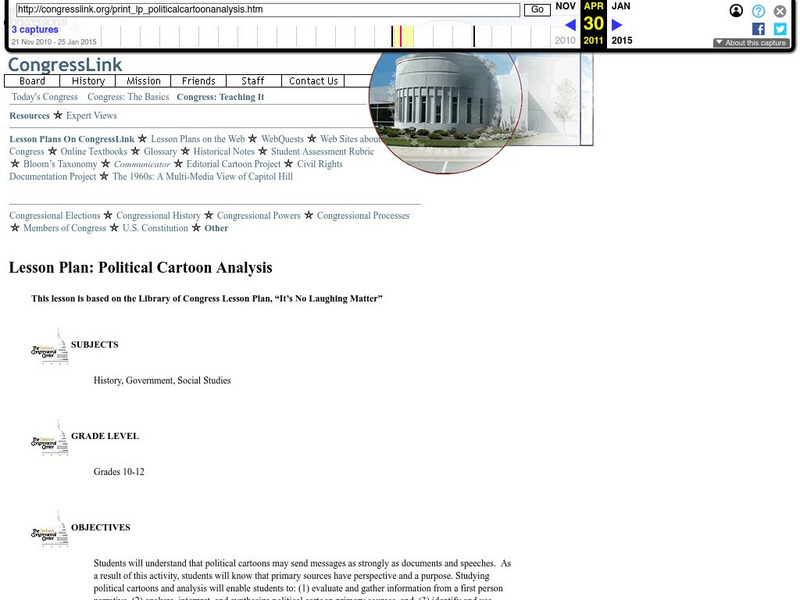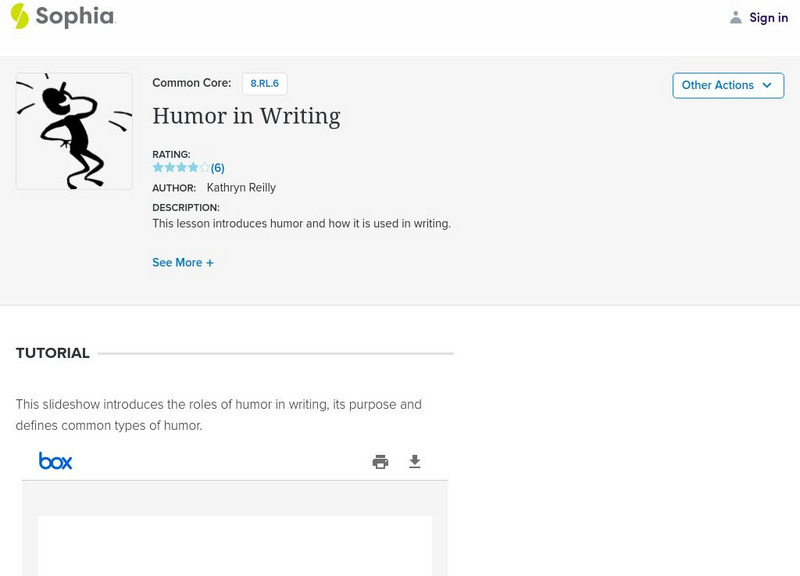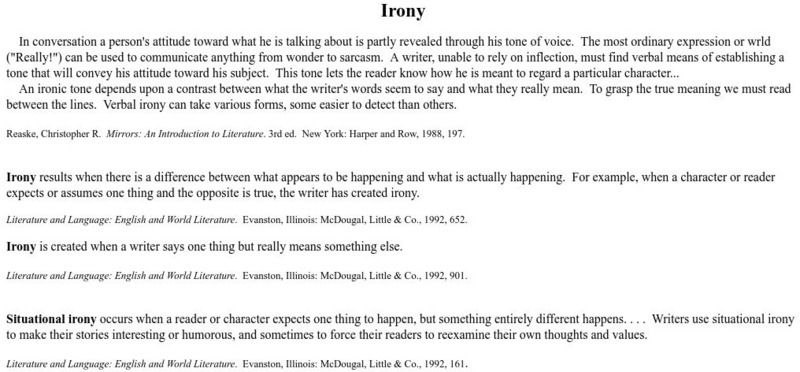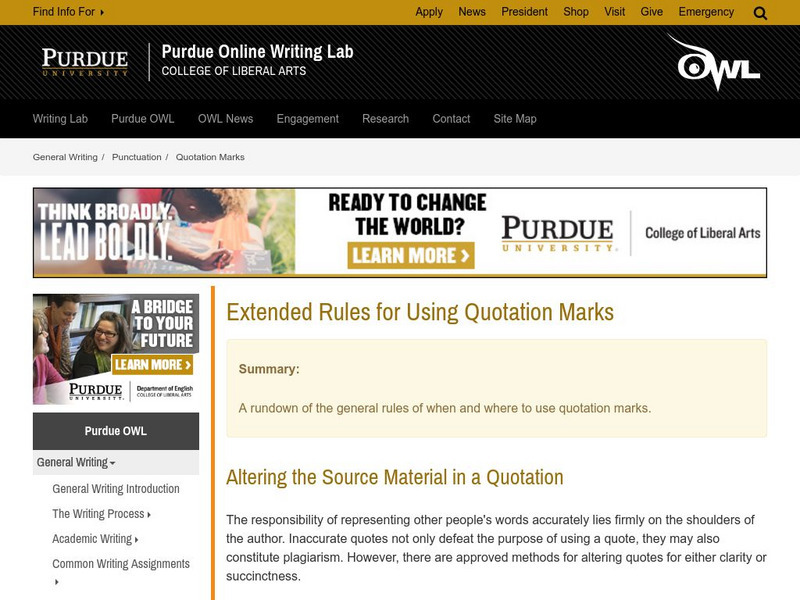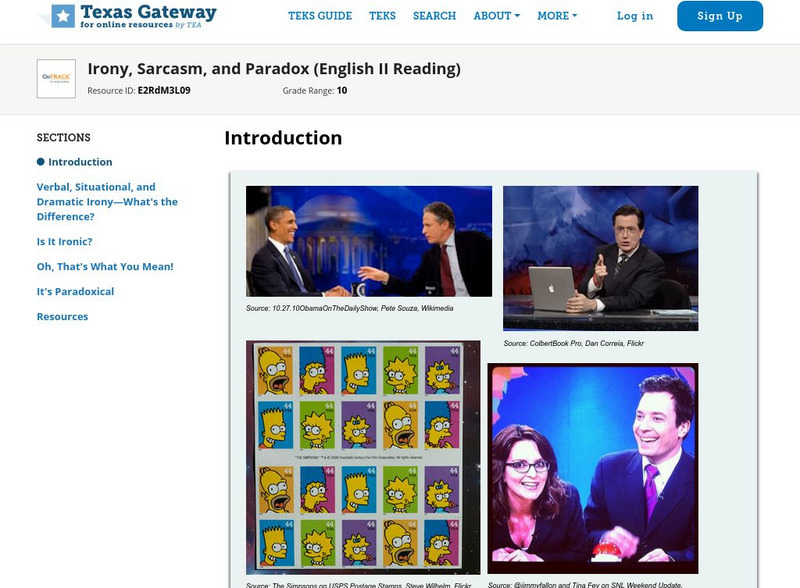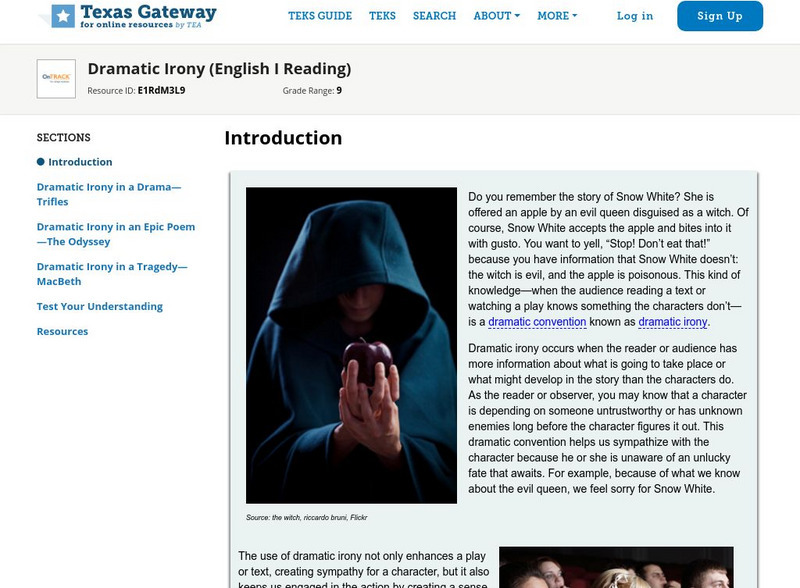Other
Story in Literary Fiction: Humor and Fiction
This essay discusses the effects of humor in fiction, and provides some advice to writers on how to incorporate humor in their writing.
Other
Dirksen Congressional Center: Political Cartoon Analysis
This activity, designed for students in grades 10-12, will develop an understanding of the messages that political cartoons communicate with readers. They will examine political cartoon primary sources as they investigate the question,...
University of Victoria (Canada)
The U Vic Writer's Guide: Literary Term: Irony
This site from The UVic Writer's Guide provides an excellent description of the literary term "irony." Content includes a focus on dramatic irony, structural irony, and verbal irony.
University of Victoria (Canada)
The U Vic Writer's Guide: General Literary Terms
The University of Victoria's Writer's Guide includes an extensive list of literary and rhetorical terms. List can be displayed alphabetically.
Able Media
Figures of Speech: Rhetoric Exercises
This site is a great exercise that helps students practice identifying and translating rhetorical devices in Latin poetry. Uses examples from Book II of Vergil's Aeneid.
Virtual Salt
Virtual Salt: A Glossary of Literary Terms
This site provides a long list of literary terms complete with full definitions and examples.
E Reading Worksheets
E Reading Worksheets: Irony Lessons
In this learning module, students will learn more about the three types of irony: verbal, situational, and dramatic. A PowerPoint lesson is provided to assist the understanding of irony. This module is designed to support Tier I, Tier...
E Reading Worksheets
E Reading Worksheets: Irony Worksheets
In this learning module, students will learn more about the three types of irony: verbal, situational, and dramatic. Worksheets, activities, and a PowerPoint lesson are provided to assist with the understanding of irony. This module is...
E Reading Worksheets
E Reading Worksheets: Reading Activities
An assortment of reading mini-projects are included on this site. Reading skills worksheets and differentiated reading activities are also included.
Sophia Learning
Sophia: Humor in Writing
Eight slides introducing different types of humor in writing including irony, caricature, satire, wit, blunders, hyperbole, jokes, practical jokes, and puns.
Other
Chulalongkorn University: Elements of Fiction Irony
This site contains four different definitions of irony.
Rock and Roll Hall of Fame
Rock & Roll Hall of Fame: Sti Lesson 17: Irony Made Understandable
One of the more difficult literary concepts to teach is irony, especially ironic point of view. Not only do students often miss the subtle linguistic clues, they become distracted by the issue of author's intent. Whether it's the classic...
Texas Education Agency
Texas Gateway: Close Reading of Prose: Practice 1 (English I Reading)
Read carefully in order to identify diction, tone, and irony and evaluate their impact on the meaning of a text.
Texas Education Agency
Texas Gateway: Irony, Sarcasm, Paradox (English I Reading)
[Accessible by TX Educators. Free Registration/Login Required] Identify and explain the purpose of irony, sarcasm, and paradox in a text.
Texas Education Agency
Texas Gateway: Dramatic Irony (English I Reading)
Recognize dramatic irony and explain how it functions in a play.
Other
Blinn College: Bryan Writing Center: Poetry Explication [Pdf]
Provides guidelines for analyzing poetry. Students must make certain they have a basic understanding of a poem, then analyze the language used. A set of 26 questions is offered that students can reference to help them analyze a poem....
Other
Julius Caesar: Literary Devices
Provides examples of how literary devices are used in The Tragedy of Julius Caesar. Looks at irony, motifs, themes, symbols, and how language is used.
Online Writing Lab at Purdue University
Purdue University Owl: Extended Rules for Using Quotation Marks
This page offers more rules for using quotation marks, not just the basic rules. For example, Quotation marks may be used to indicate words used to denote irony.
Love To Know Media
Your Dictionary: "Gift of the Magi" Literary Terms
This article focuses on literary terms for the "Gift of the Magi" including the narrator, characters, climax, repetition, resolution, setting, irony, theme, and symbolism.
Texas Education Agency
Texas Gateway: Close Reading of Prose: Practice 1 (English I Reading)
In this lesson, students practice close reading strategies to help them understand a writer's tone. They will examine the writer's choice of diction, details, and irony to identify the writer's attitude.
Quizlet
Quizlet: Literary Elements/humorous Fiction Terms Test
Literary terms are included in this assessment. This test assesses the following words: allusion, antagonist, dialogue, flashback, imagery, protagonist, symbol, dialect, hyperbole, idiom, irony, parody, pun, sarcasm, understatment, and...
Quizlet
Quizlet: Literary Elements/humorous Fiction Terms Flashcards
Literary elements are included in this review exercise. Flashcards are provided for the following words: allusion, antagonist, dialogue, flashback, imagery, protagonist, symbol, dialect, hyperbole, idiom, irony, parody, pun, sarcasm,...
Texas Education Agency
Texas Gateway: Literary Text: Irony, Sarcasm, and Paradox
[Accessible by TX Educators. Free Registration/Login Required] In this lesson, you will learn to evaluate the role of irony, paradox, and sarcasm in literary nonfiction such as speeches and essays. Take a look at the chart; it contains...
Texas Education Agency
Texas Gateway: Dramatic Irony (English I Reading)
This lesson focuses on dramatic irony, when the reader or audience has more information about what is going to take place or what might develop in the story than the characters do.



